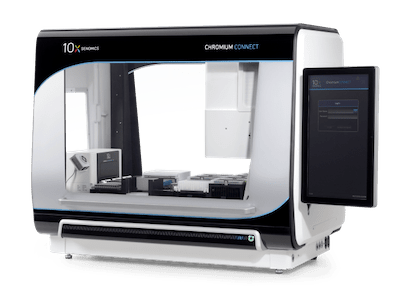Automating single cell workflows: Learn how Roche and Pfizer are using Chromium Connect to optimize drug development
10x Genomics Chromium Connect, an automated platform for single cell gene expression and single cell immune profiling, can increase your laboratory’s efficiency and productivity by shortening hands-on time from more than eight hours to less than one hour. In this post, we feature two pharmaceutical companies, Roche Innovation Center Zurich (RICZ) and Pfizer, that are implementing Chromium Connect automation to advance novel targets through their drug pipelines.

With our flagship product, the Chromium Controller, users are able to perform single cell partitioning and barcoding—enabling integrated analysis of single cells at high-throughput and large scale. Now, with Chromium Connect available for both 10x Genomics Single Cell Gene Expression and Single Cell Immune Profiling solutions, users can automate their single cell workflows by going from single cell suspensions to sequencing-ready single cell gene expression libraries, with the option to add on TCR/BCR libraries.
Consistency, productivity, and integration
Whether performing one-off studies in an academic setting, high-throughput processing in a core lab, or multiple and simultaneous assays within a pharmaceutical drug discovery and development environment, researchers of all stripes can take advantage of the benefits of Chromium Connect, which include being able to generate consistent results, maximize lab productivity, and integrate validated workflows.
The Chromium Connect instrument enables researchers performing single cell studies to generate consistent and reproducible single cell gene expression results, spanning experiments and users. Chromium Connect can help eliminate errors introduced by manual pipetting and reduce hands-on time from more than eight hours to less than one hour. Both new and experienced single cell researchers can easily use Chromium Connect. Importantly, Chromium Connect offers users the flexibility to run between one and eight samples, so there’s no need to process samples in batch.
Now, by adding automation for our 5’ gene expression solutions, users can tackle more difficult immunology questions. With Chromium Connect for Single Cell Immune Profiling, users are able to automate their 5’ gene expression and V(D)J amplification workflows looking at cellular heterogeneity of the immune system and T- and B-cell receptor diversity at scale. This expands the supported capabilities of Chromium Connect beyond automated 3’ gene expression workflows to enable researchers to investigate heterogeneity of the immune system with greater productivity.
Automation in pharma: Advancing drug discovery and development
Single cell methods, with their improvement over bulk analyses and ability to provide a detailed readout of heterogeneity of cell type and state, are revolutionizing drug discovery and development at pharmaceutical companies. Even still, the lack of automation for single cell workflows has been a hindrance for pharma; here, it’s the norm to run multiple experiments simultaneously, users have different degrees of training, and there exists a need for large-scale and high-throughput analyses to speed up the drug-making process.
Key to successful clinical studies are consistency and reproducibility across all stages of drug development. For pharma, long-term studies, geographically distributed research sites, and ongoing global projects involving many actors are all potential sources of variability that can lead to lack of reproducibility. By automating single cell gene expression workflows, however, pharma companies can aim to standardize the process of library preparation, helping to eliminate at least one source of variability. On numerous fronts, an automated platform would free up significant time and resources.
Roche
According to Emilio Yángüez, PhD, Senior Scientist, and Tamara Hüsser, Principal Research Associate, at Roche Innovation Center Zurich (RICZ), one of the pharmaceutical companies that beta tested the automated immune profiling workflows, the company plans to use the platform for their drug discovery projects. “We work with all kinds of samples—cell suspensions, tissue from different sources, [etc.]—with different sample preparation protocols prior to the generation of single cell suspensions for scRNA-seq analysis,” RICZ says. “The samples come from a variety of projects addressed to characterize the activity of in-house compounds in all the stages of development—from discovery to clinical studies.”


Without automation, RICZ faced significant challenges. “We usually work with relatively big projects with lots of different samples that should be compared. Time consuming sample preparation is usually needed, [i.e.], tissue digestion, FACS sorting, [etc.], which limits the number of samples that we can process in parallel. The fact that we had to manually prepare libraries was a limitation to our current throughout that was partially addressed by the use of the Connect.”
Indeed, RICZ had clear goals when bringing in Chromium Connect. “Our main motivation was the possibility of automating sample processing to increase our throughput, reproducibility, and working efficiency,” they say. “Our idea would be [to rely] almost exclusively on the Connect for the library preparation.”
Pfizer
According to Mark Ozeck, Scientist, at Pfizer, another beta tester of the automated immune profiling workflows, the company plans to use the platform for a variety of investigations, including “oncology animal models, human clinical samples, cancer cell lines, tumor organoid cells, etc.,” Pfizer says. “We support both research and clinical stage projects.”

Without automation, Pfizer faced serious challenges as well. “The current manual workflow requires a great deal of hands-on time and can lead to processing errors.”
Pfizer, too, had goals for using the Chromium Connect instrument. “The Connect allows for increased productivity, as lab scientists are able to perform other tasks while single-cell libraries are prepared by the instrument,” Pfizer says. “We plan to use the Chromium Connect to prepare all of our 10x [Genomics] single-cell RNA and VDJ libraries.”
Consistency is key
At RICZ, they usually try to process eight samples in parallel and perform up to three runs per week, on average, using the Chromium Controller. There are seven people working in the lab, two of them working almost exclusively on the scRNA-seq workflow (with help from colleagues for sample preparation).
When they added Chromium Connect to their lab, they realized the benefit as it pertains to consistency.
“Due to the easy operation, it ‘democratizes’ the technology, as less experienced colleagues can also successfully process samples for scRNA-seq analysis.”
At Pfizer, on average they run eight samples at a time and perform one run per week on the Chromium Controller. There are four people working in the lab, one of them working on the scRNA-seq workflow.
“It greatly reduces hands-on time, which frees up our lab scientists for other work,” Pfizer says.
Productivity is essential
At RICZ, using Chromium Connect only adds to their company’s approach to optimizing workflows. “It definitely helps [with] increasing productivity, as we do not need to prepare libraries manually,” they say. “10x Genomics library preparation, although straightforward, is rather time consuming. Automating this task allows us to increase our throughput, as we can process more samples with the same number of people involved. Moreover, we have more time for new protocol development, sample processing optimization, and other important tasks to improve our scRNA-seq pipeline.”
Pfizer’s Ozeck agrees that it optimizes their workflows. “The Connect allows us to be more efficient with our time and double our productivity, since we’re able to work on other projects while the Connect is generating single-cell libraries.”
Integrated workflows offer scale
With automated immune profiling now accessible on Chromium Connect, pharma users are able to scale up experiments to include more data per experiment—enabling more projects and faster time to completion. In terms of scaling up, RICZ says, “In our case, the main limitation to the number of samples we process per day is usually the sample preparation, [i.e.], tissue digestion, FACS sorting, [etc.]. The Connect is not significantly changing our daily throughput. However, automating the library prep helps [increase] the number of runs we perform per week, and now we can easily process up to 32 samples per week from sample thawing to libraries being ready to run.”
While RICZ would like to use Chromium Connect exclusively for library prep, “this is not possible at the moment because some of our projects include sample multiplexing or feature barcoding, which are not yet implemented in the robot.”
Pfizer’s Ozeck voices the same concern, but believes that scaling up will be achievable “once the sample multiplexing functionality is added to the Connect instrument.” In the meantime, increased productivity is allowing Pfizer’s projects to move forward faster—which is key to momentum in the industry.
“[Connect] will allow us to deliver on other projects earlier than before, as we don’t have to be at the lab bench at all times to manually prepare single-cell libraries.”
To learn more about how Chromium Connect can automate your single cell gene expression and immune profiling workflows, visit the product page.
This article contains a discussion of research and processes conducted by scientists at Pfizer and Roche Innovation Center Zurich. View and opinions do not constitute endorsement or promotion of 10x Genomics, Inc. or any of its products.
